10 Best Customer Communication Management Software in 2026
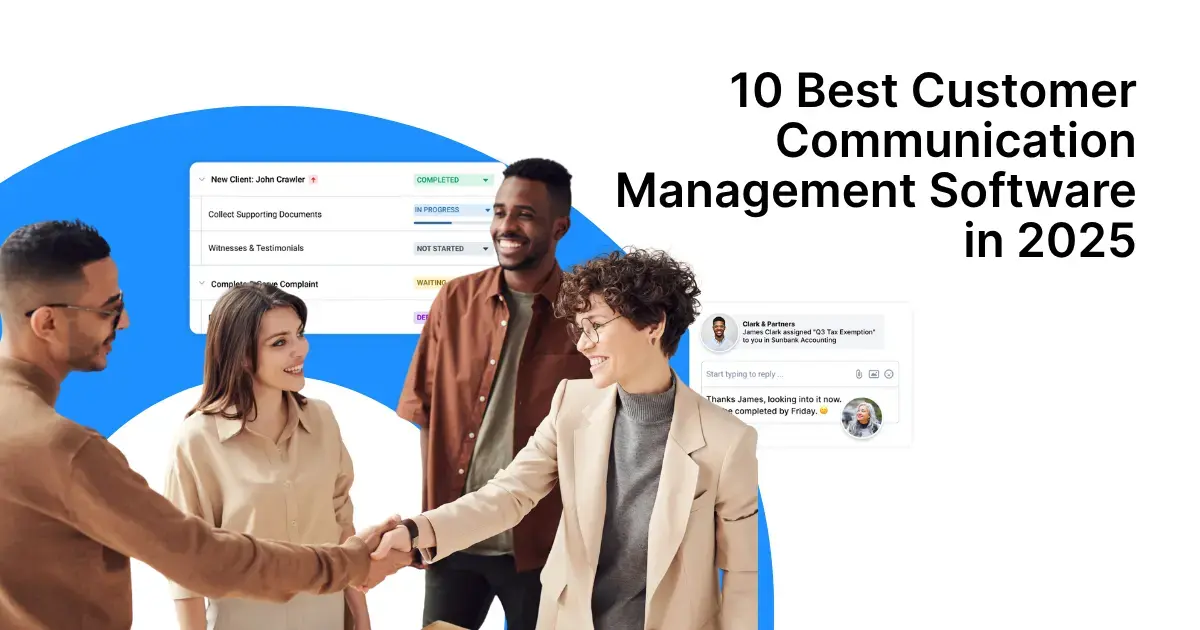
Customer communication management software helps businesses securely exchange messages, files, updates and documents across channels, especially with clients. From legal firms and marketing agencies to finance teams and real estate professionals, these tools provide a central hub for improved client communications, enhancing visibility and reducing email clutter.
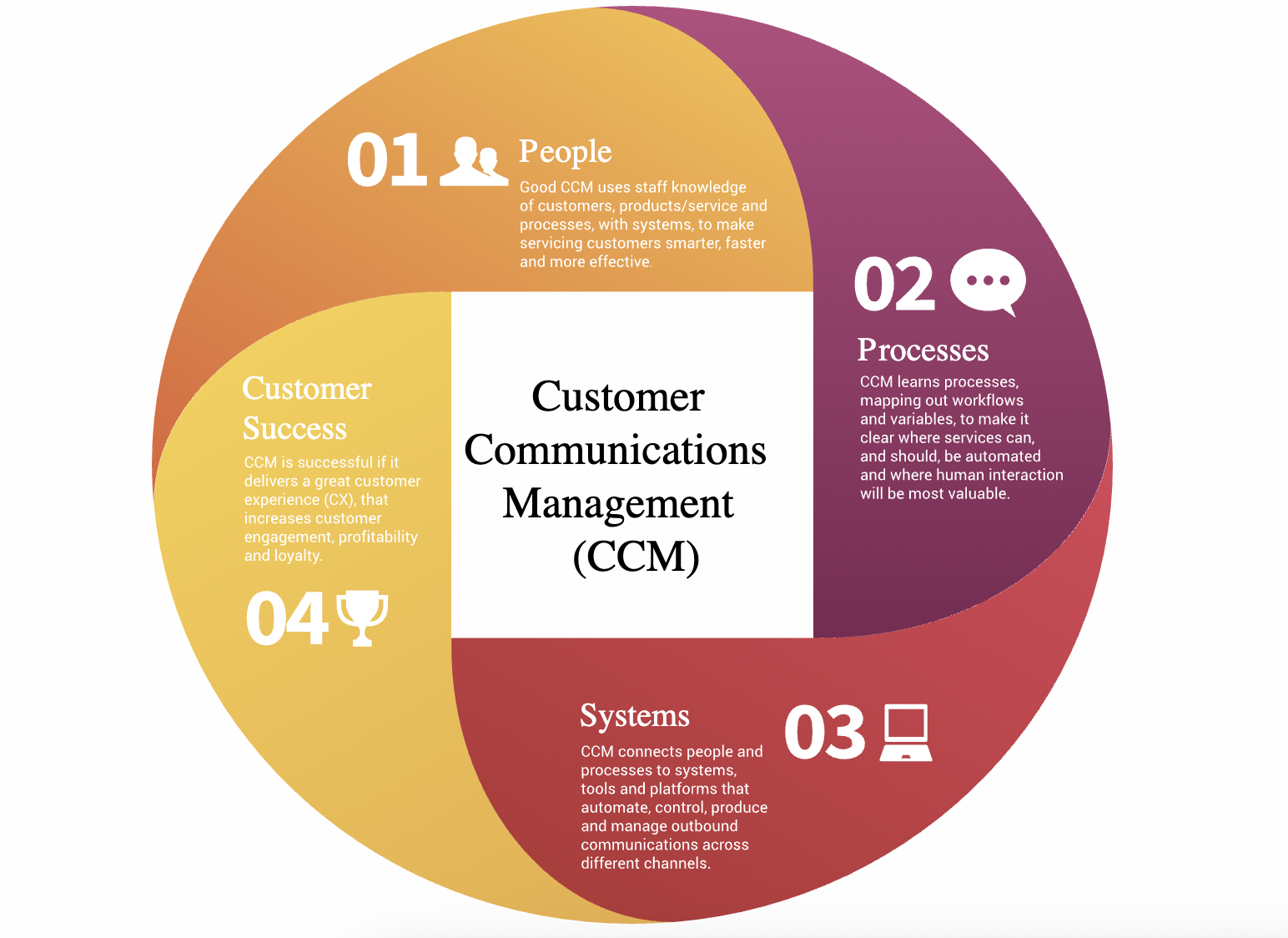
Today, clients expect more than just a quick response. They want a branded, secure and professional experience: one that reflects the value of your service. Internal tools, scattered inboxes or shared drives can leave a messy impression and introduce unnecessary risk to customer data. That’s why customer communication management software has become essential for teams that regularly interact with clients and need to share sensitive information or collaborate on projects.
In this guide, we’ve reviewed ten platforms to help you manage client communication more effectively. For each tool, we’ve broken down what it does well, where it falls short and what kind of teams it’s best suited for.
Let's dive in!
Comparison table: Customer communication tools at a glance
Best customer communication software in 2026
The right customer communications management platform can help you deliver a smoother, more secure and more branded experience to your clients in a growing agency, a project-based consulting firm or a highly regulated service business scenario.
Let's see how they compare.
Clinked
Clinked is a customer communication management platform for client-facing work. While many tools focus on internal operations or support chats, Clinked offers an even more extensive, centralized, secure space where your team and clients can share files, exchange updates and collaborate on projects, all under your brand, enabling a smooth experience and high customer engagement.
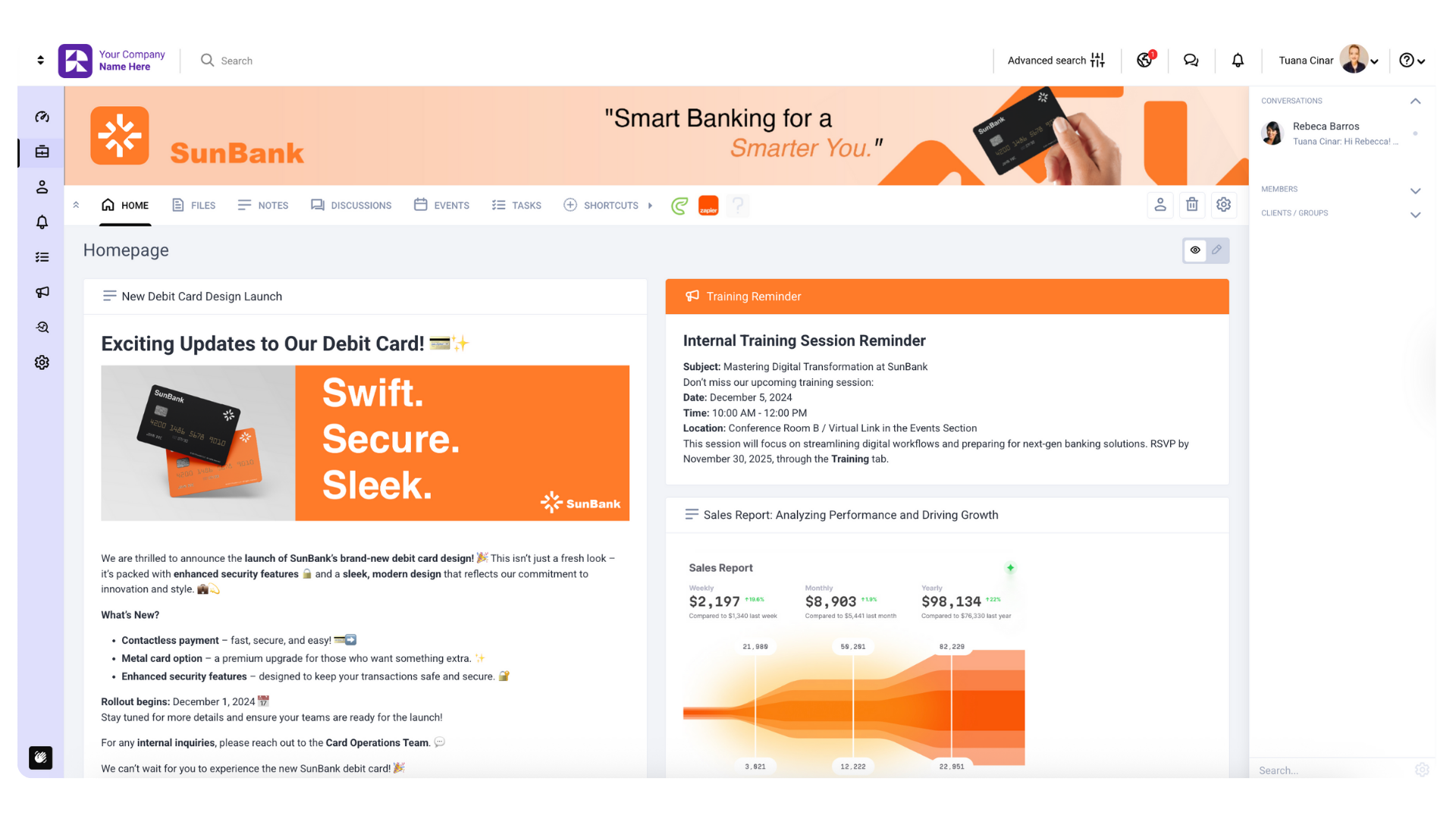
As a customer communications management tool, it covers the full spectrum of communication needs: from document delivery and feedback collection to real-time messaging, tasks and approvals. What makes it stand out from competitors is its extensive white-label flexibility and enterprise-grade security, making it ideal for businesses that want to deliver a polished, compliant and professional experience across every interaction.
Strengths
- Fully white-labeled: Customize your customer communications portal with your own domain, logo, interface and even a branded mobile app
- Enterprise-grade security: Protect customer data with ISO 27001 certification, GDPR and HIPAA readiness, SSL encryption in transit and AES encryption at rest
- Real-time communication: Chat with clients using multiple channels such as built-in group chat, private messaging, @mentions and threaded discussions, even on the go with our mobile app
- Task and workflow management: Assign tasks, request files, set deadlines and track approvals using Kanban boards and shared calendars
- Audit-ready compliance: Maintain full visibility with activity logs, role-based permissions and approval trails
- Flexible integrations: Connect your customer portal to Google Workspace, Microsoft 365, DocuSign, Adobe Sign and thousands of other tools via Zapier
- Easy for clients: Offer a smooth customer journey to the business users with a 5/5 usability rating, no development work needed for onboarding
Weaknesses
- Limited CRM features: Doesn’t include marketing automation or advanced sales pipeline tools
Ideal for
B2B service providers, consulting firms, legal and finance teams, agencies or any business that needs a secure, branded customer communication management solution to manage customer interactions and documentation, especially where compliance and professional presentation are non-negotiable.

Odoo
Odoo is a modular ERP platform with over 40 integrated business apps, including CRM, project management, invoicing and basic features of the client portal solution for communication processes. As a customer communication management (CCM) tool, it lets teams share updates and files with clients through portal access integrated into broader operational workflows.
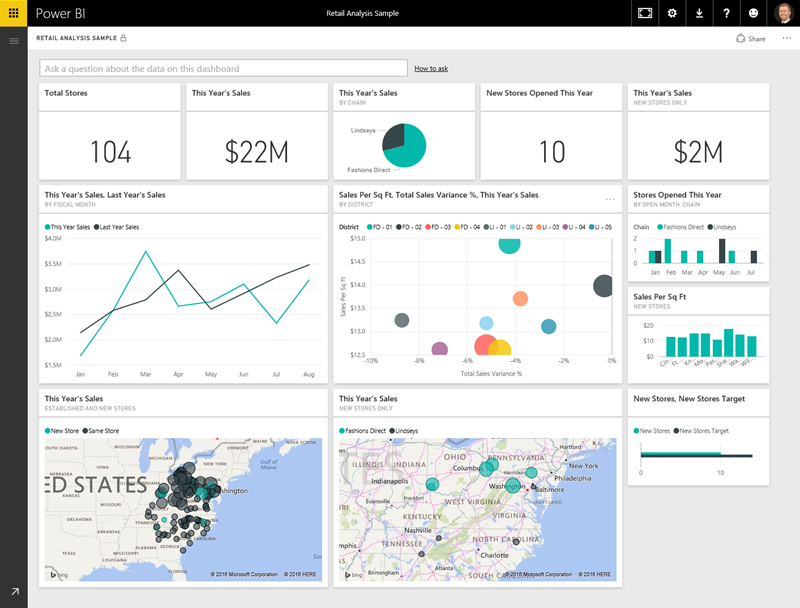
Strengths
- Modular ERP suite: Use the CRM portal, invoicing and project tracking in one integrated platform
- Customizable: Tailor the system to your needs with open-source flexibility and a large extension ecosystem
- Portal add-ons: Let clients access project updates and documents through a basic portal interface (read-only by default)
Weaknesses
- Limited branding: No built-in white-label options
- Developer-heavy: Requires technical setup for client use
Ideal for
Mid-sized businesses already enjoying the numerous benefits of Odoo’s workforce management who only need basic client access and prefer to avoid a major digital transformation to other Odoo alternatives.
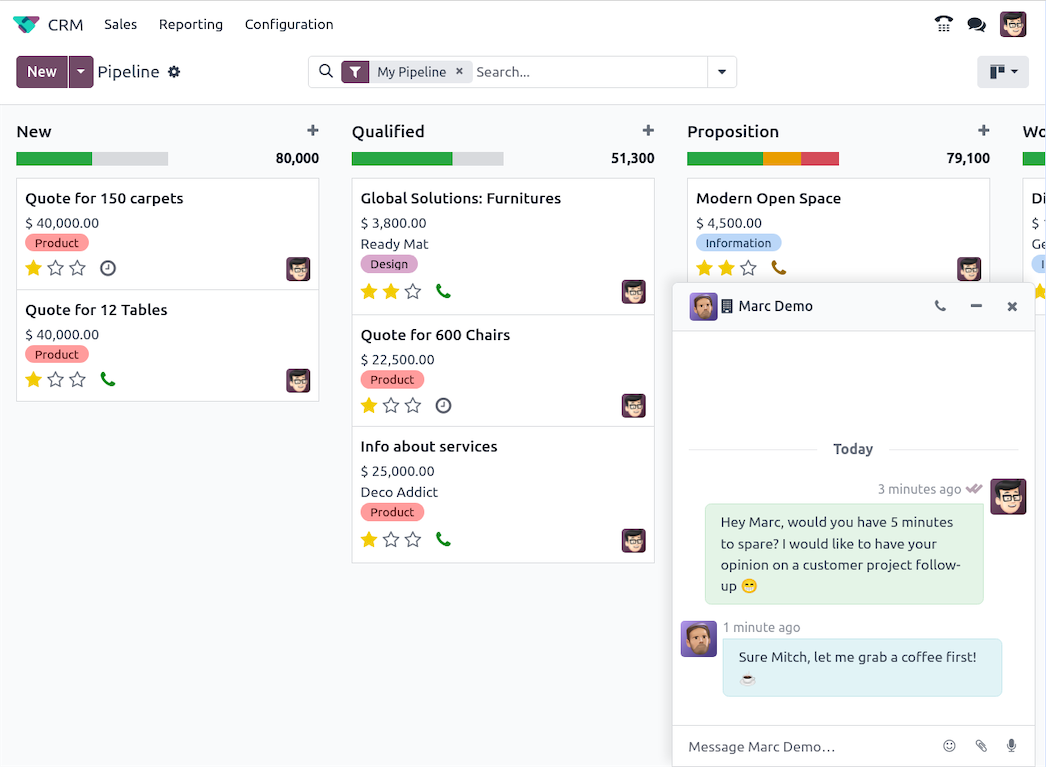
How does it compare to Clinked
Odoo is ERP-first with limited, clunky client access. Clinked is collaboration-first, built to deliver a seamless, branded client experience out of the box.
Softr
Softr is a no-code builder for creating client-facing web apps, dashboards and portals using Airtable or Google Sheets as the backend. As a CCM platform, it enables basic client access and visibility through lightweight, custom dashboards. It’s suitable for fast deployment and made the list for giving small teams a flexible, design-friendly option.
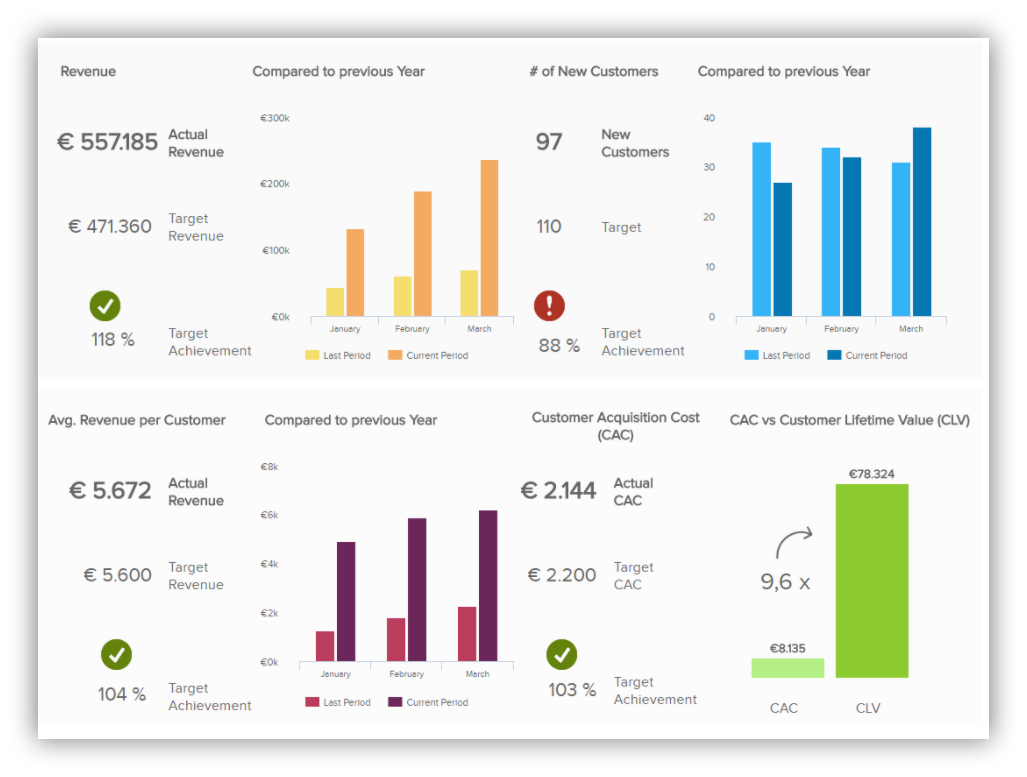
Strengths
- No-code builder: Build customer communication portals without writing code
- Fast deployment: Launch client-facing pages quickly for MVPs or basic portals for customer queries
- Visual flexibility: Customize layouts, permissions and content using drag-and-drop components
Weaknesses
- Limited collaboration tools: No chat, approvals or tasks
- Limited white-labeling: Basic branding only, with logos and colour changing option
Ideal for
Freelancers or early-stage teams needing simple dashboards for help desk software.
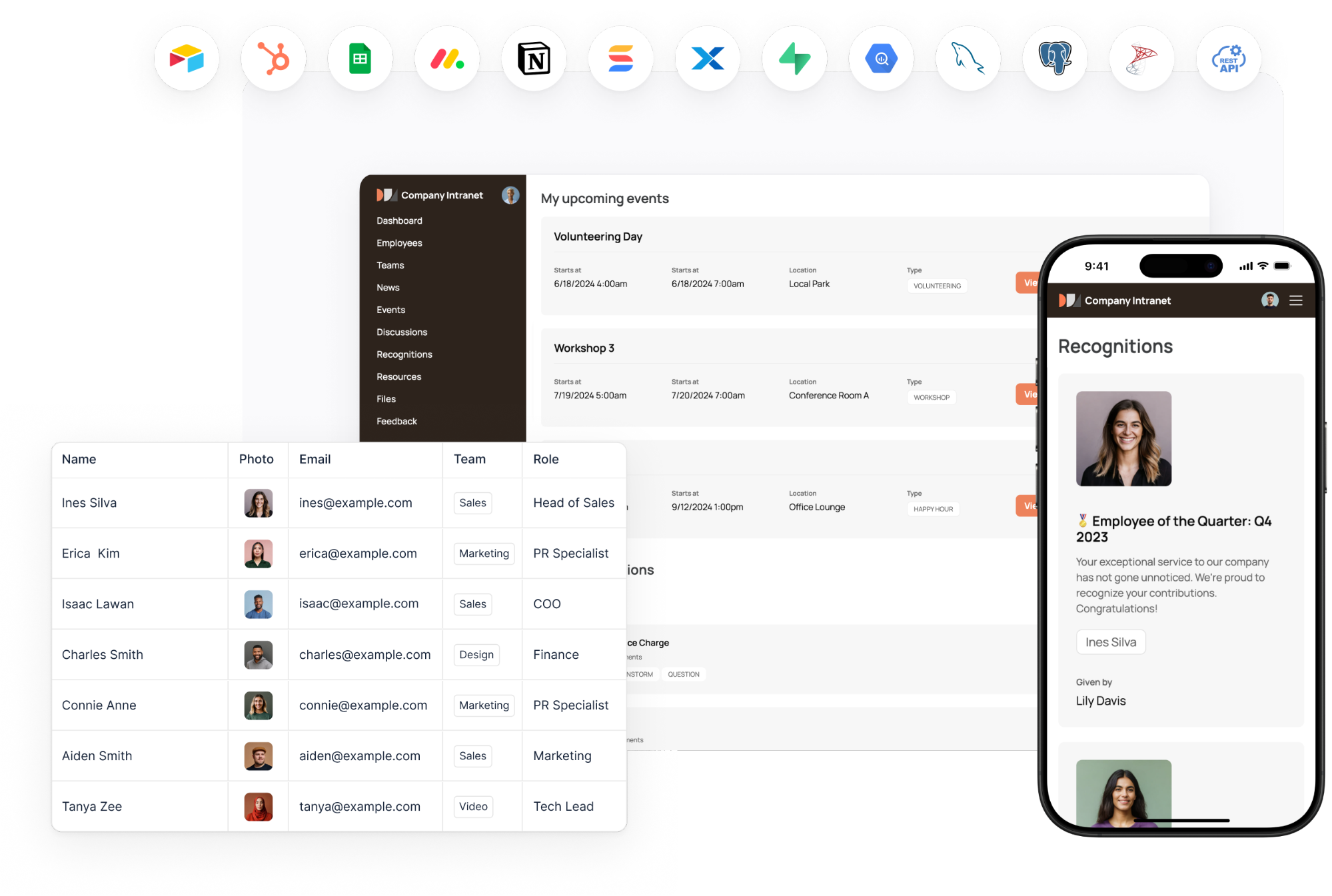
How does it compare to Clinked
Softr is fast and flexible, but lacks security and collaboration depth compared to some Softr alternatives. Clinked is better suited for regulated, client-facing environments that require full control and communication.
SuiteDash
SuiteDash is a business suite that combines CRM, billing, project management, client portals and automation tools. It's on our list of CCM solutions as it supports end-to-end customer communications with messaging, forms and file sharing built into its workflows. It’s useful for small teams looking to centralize both internal and client-facing operations.
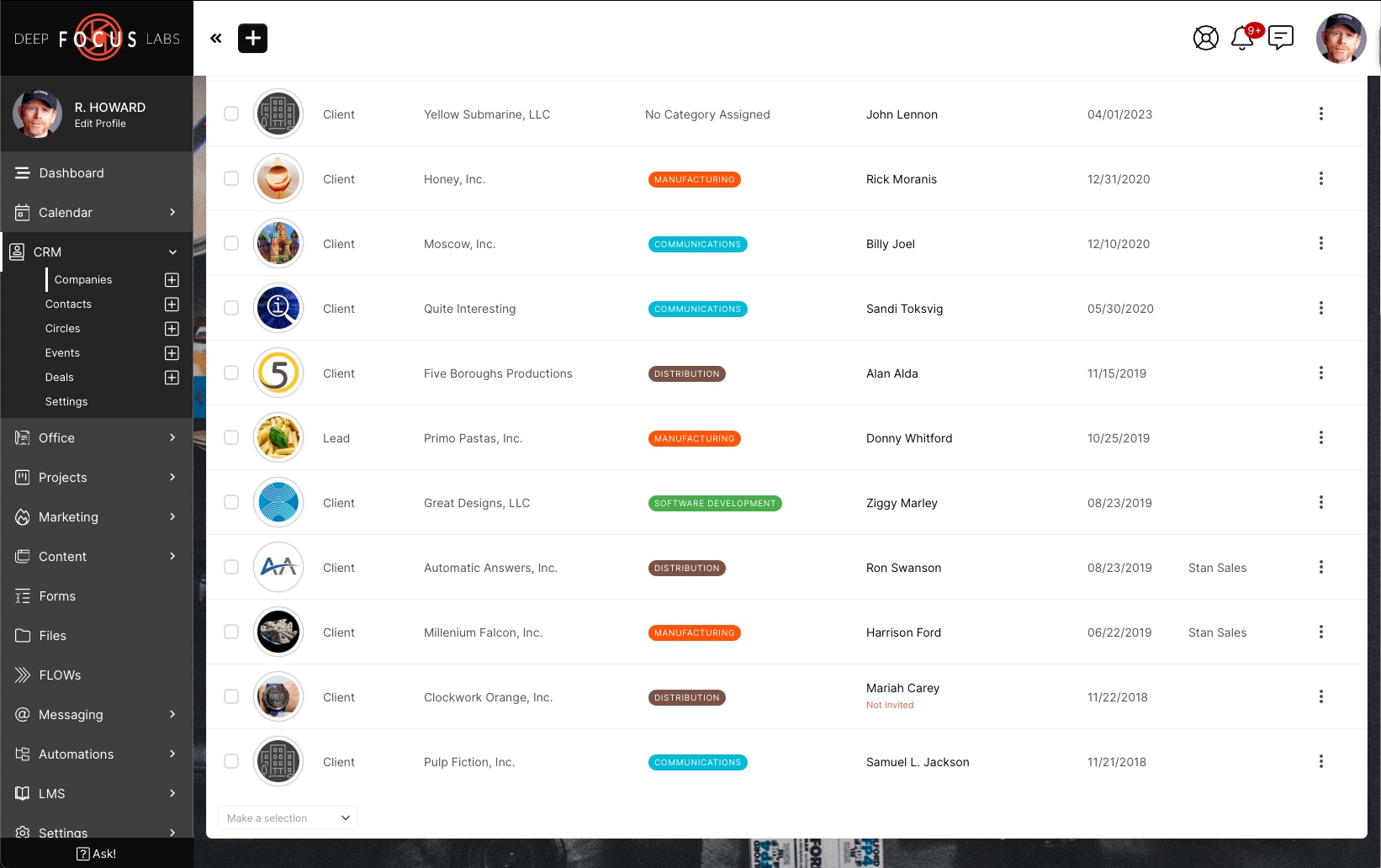
Strengths
- All-in-one toolset: Manage CRM, billing, file sharing and client messaging in one platform
- White-label options: Customize your client dashboard with your own branding
- Built-in automation: Automate tasks, reminders and workflows to streamline processes, save time on client management and create consistent customer experiences
Weaknesses
- Steep learning curve: Takes time to configure properly
- Limited compliance visibility: No public ISO or HIPAA credentials
- Heavy UX: Feels bulky for teams that just need secure communication
Ideal for
While many SuiteDash alternatives are easier to use, some can also lack depth. SuiteDash works well for small businesses that want to consolidate operations into one tool and are willing to invest time in setup.
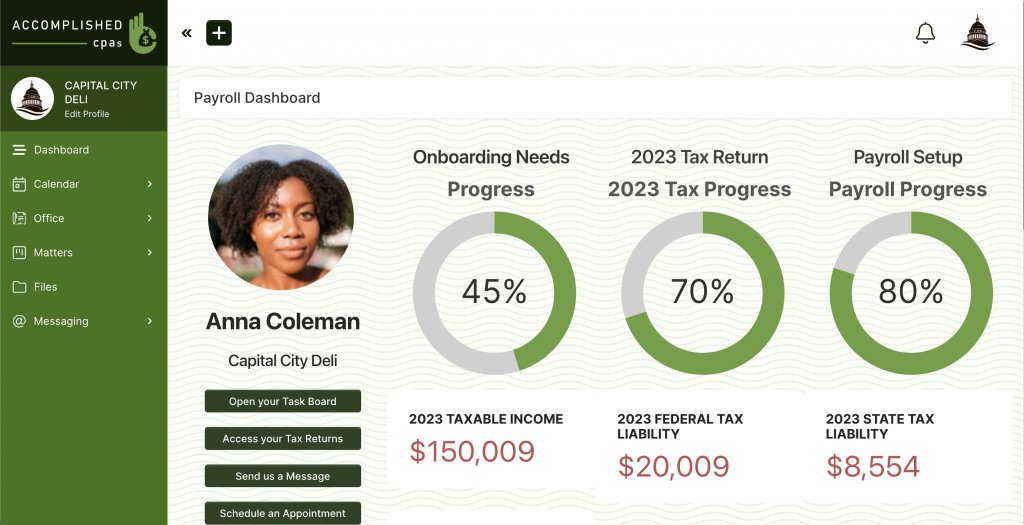
How does it compare to Clinked
SuiteDash is feature-rich but more complex. Clinked is easier to adopt and more focused on secure, branded client interaction. Furthermore, Clinked offers a mobile app experience to the users, making it more appealing to your clients who like to receive updates on-the-go.
Moxo
Moxo is a client interaction platform designed for high-touch service delivery, with features like guided workflows, messaging and digital onboarding. As a customer communication management (CCM) software, it structures how customer communications are delivered across tasks, documents and approvals. It’s a fit for enterprise teams managing complex, ongoing relationships.
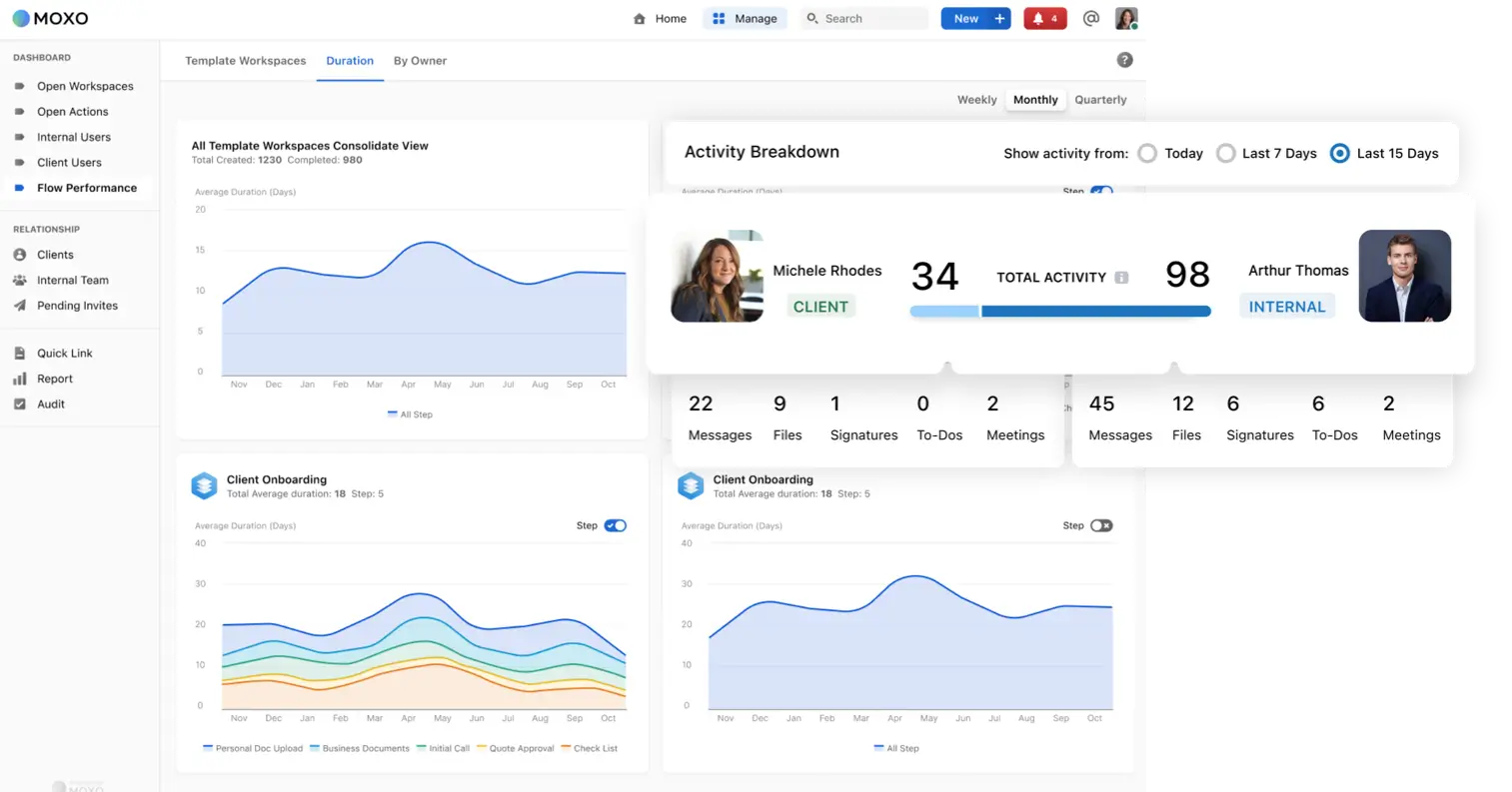
Strengths
- Structured workflows: Guide clients through tasks, approvals and document requests with built-in workflows
- Enterprise-grade security: Leverage customer data compliant with SOC 2 certification for highly personalized communications
- White-label options: Brand your client portal and mobile app for a consistent, professional experience that empower business users
Weaknesses
- Complex setup: Requires more time and resources to implement and manage
- Nontransparent pricing: You’d need to hop on a sales call before receiving a quote to help you budget their solution
Ideal for
Large service organizations in need of comprehensive portals for ongoing client engagement. If Moxo's CCM software does not meet your automation requirements, check Moxo alternatives such as Clinked.
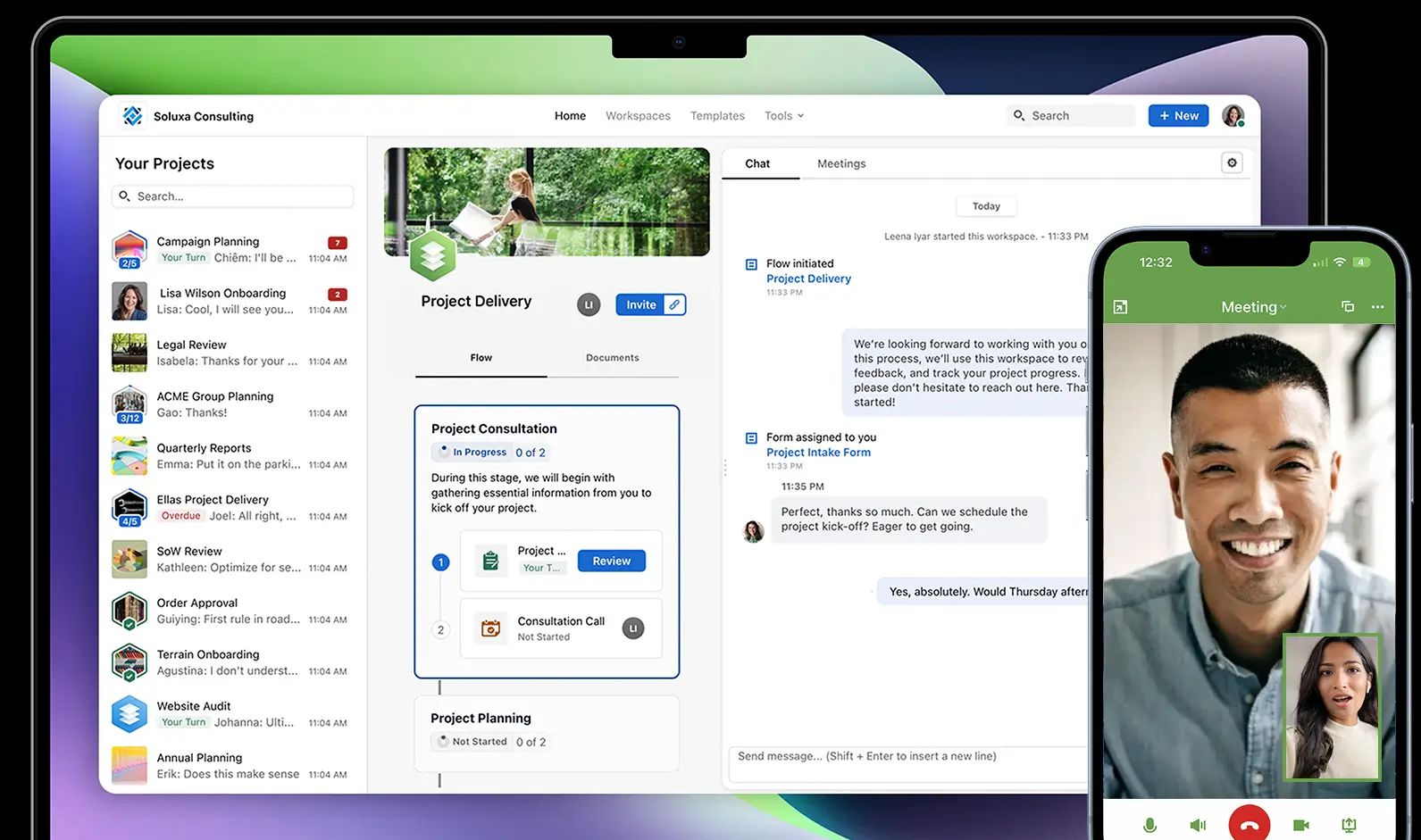
How does it compare to Clinked
Moxo is rather process-heavy. Clinked offers similar collaboration features with a faster setup, simpler interface and easy-to-use mobile app. On top of that, Clinked is ISO 27001 certified and offers transparent pricing.
ShareFile
ShareFile is a secure file-sharing solution that enables encrypted document exchange, client file requests and basic access controls. As a customer communication management software, it facilitates one-way communication through compliant document delivery. It made it to our list for its role in industries where secure file transfer is central to the client experience.
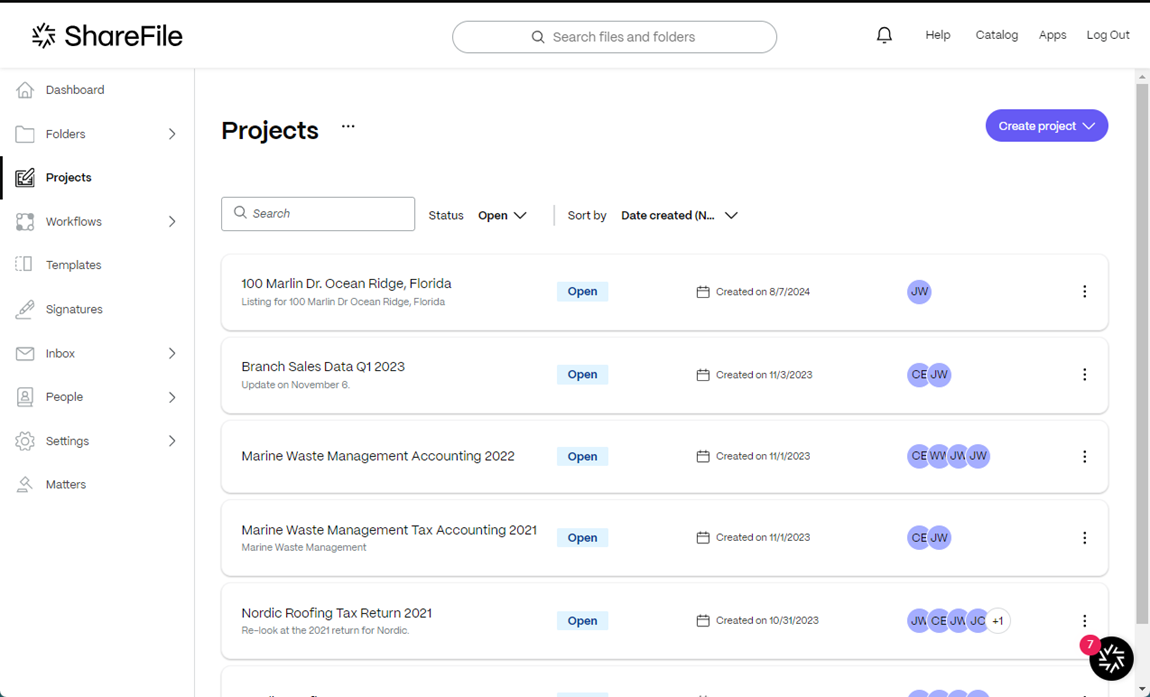
Strengths
- Secure file exchange: Send and receive encrypted documents with custom expiration dates and access settings
- Compliance-ready: Meet HIPAA, GDPR and SOC 2 standards without additional setup
- User-friendly: Let clients access files easily without needing to create an account
Weaknesses
- No real-time collaboration: Lacks chat, tasks or shared online workspaces
- Limited branding: Customization is minimal and feels like an add-on
Ideal for
Legal, tax or accounting teams that primarily exchange documents and need strong compliance without the full operational efficiency of a portal for customer interactions.
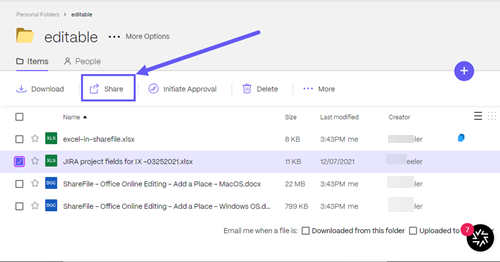
How does it compare to Clinked
ShareFile handles secure delivery well, but Clinked adds collaboration, chat and task workflows, making it a more robust CCM platform, better for interactive, ongoing client communication.
Copilot
Copilot is a modern customer communication platform that combines messaging, invoicing and file sharing in a clean, user-friendly interface. It simplifies one-on-one interactions and gives small teams an accessible way to manage client communication and gain insight into data analytics. Copilot's customer communication management solution works well for freelancers and small agencies.
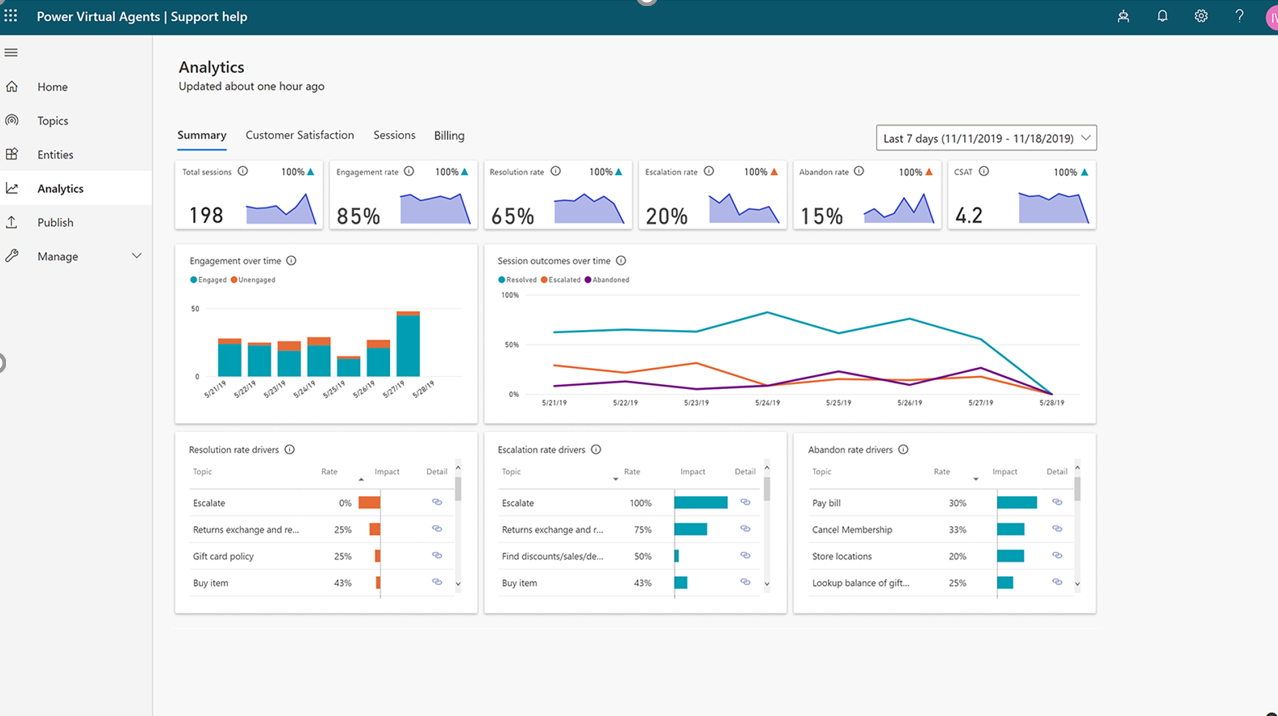
Strengths
- Clean interface: Give your clients and team a simple, intuitive portal experience
- Built-in billing and messaging: Invoice clients and manage conversations in one place
- Basic white-labeling: Add your logo and branding to personalize the client-facing portal for better customer satisfaction
Weaknesses
- Limited scalability: Not built for complex workflows or larger teams
- Weak compliance coverage: Lacks advanced certifications
Ideal for
Freelancers, small studios and agencies looking for a polished portal to manage client payments, messages and files.
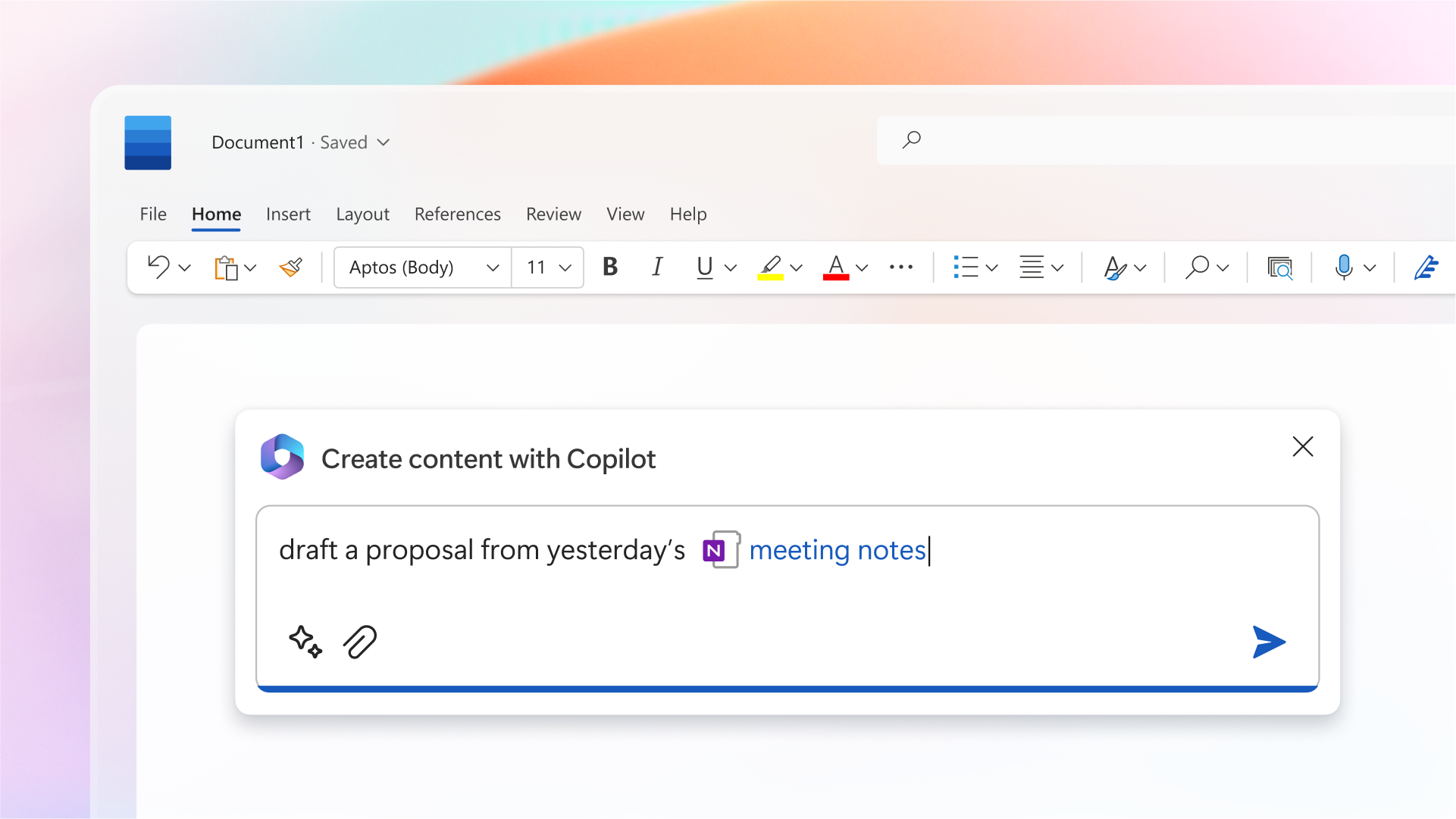
How does it compare to Clinked
Copilot is simpler and good for solo use, but Clinked offers stronger compliance, deeper collaboration and scalability for growing service teams.
Planhat
Planhat is a customer success platform that helps internal teams track account health metrics (such as trends in engagement in interactions), client usage patterns and lifecycle stages. As a CCM platform, it includes client-facing portals, where you and your customers can collaborate on documents, projects, data, and support. It’s valuable for SaaS businesses prioritizing retention and insights into customer interactions.
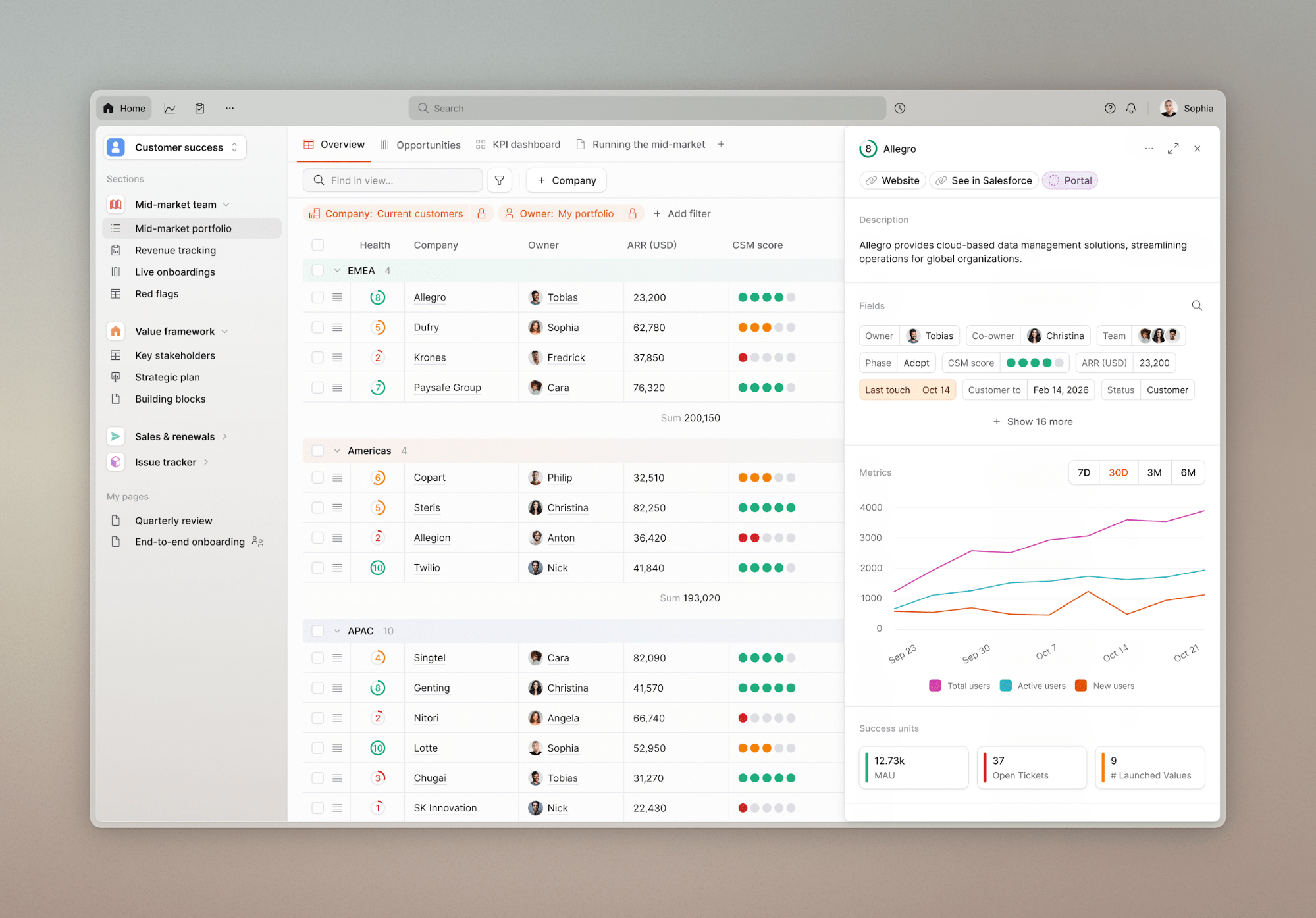
Strengths
- Account health insights: Monitor client usage, renewals and engagement trends in real time
- Customer portals: Collaborate with clients on tasks, tickets, planning documents and projects in one shared space
- Real-time sync: Stream chats, data updates and files between your internal workspace and the client portal
- Granular access control: Invite contacts and manage permissions for files, tasks or customer data points
Weaknesses
- Conditional branding: Branding is available only for global enterprises, not in the basic package
- Non-transparent pricing: Comprehensive sets of features per plan is available on site but without a quote
Ideal for
SaaS and subscription businesses with internal CS teams managing customer retention and success metrics.
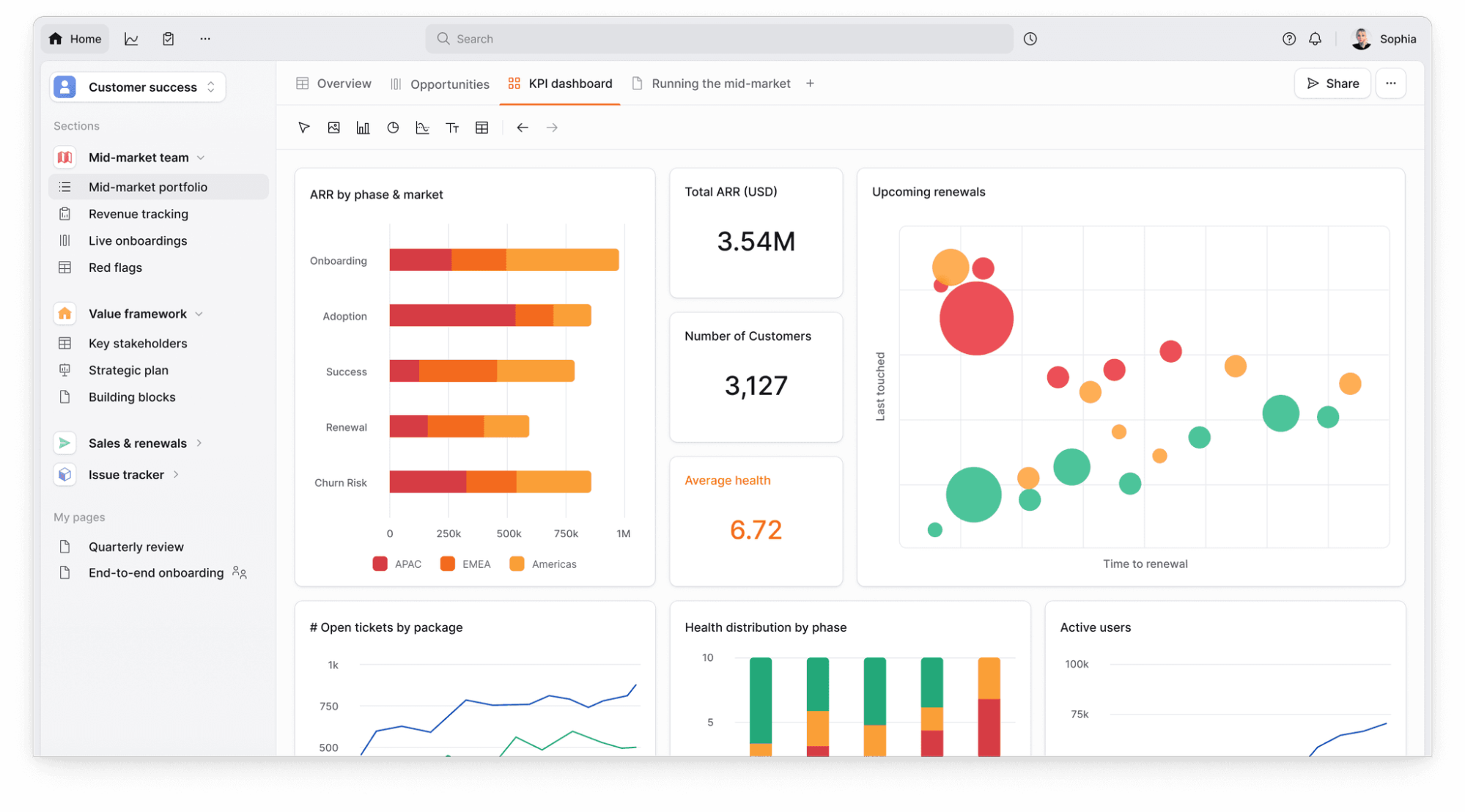
How does it compare to Clinked
Planhat is for internal teams only, focused on analytics of customer interactions within multiple communication channels. On the other hand, Clinked is designed for secure, personalized communications with clients, filling the gap that Planhat does not address.
vcita
vcita is an AI-powered CRM and business management tool intended for solo professionals and small teams. It offers operational efficiency features, including appointment scheduling, billing, marketing automation and client messaging. As a CCM software solution, it handles ongoing customer engagement through automated reminders, client messaging and CRM workflows.
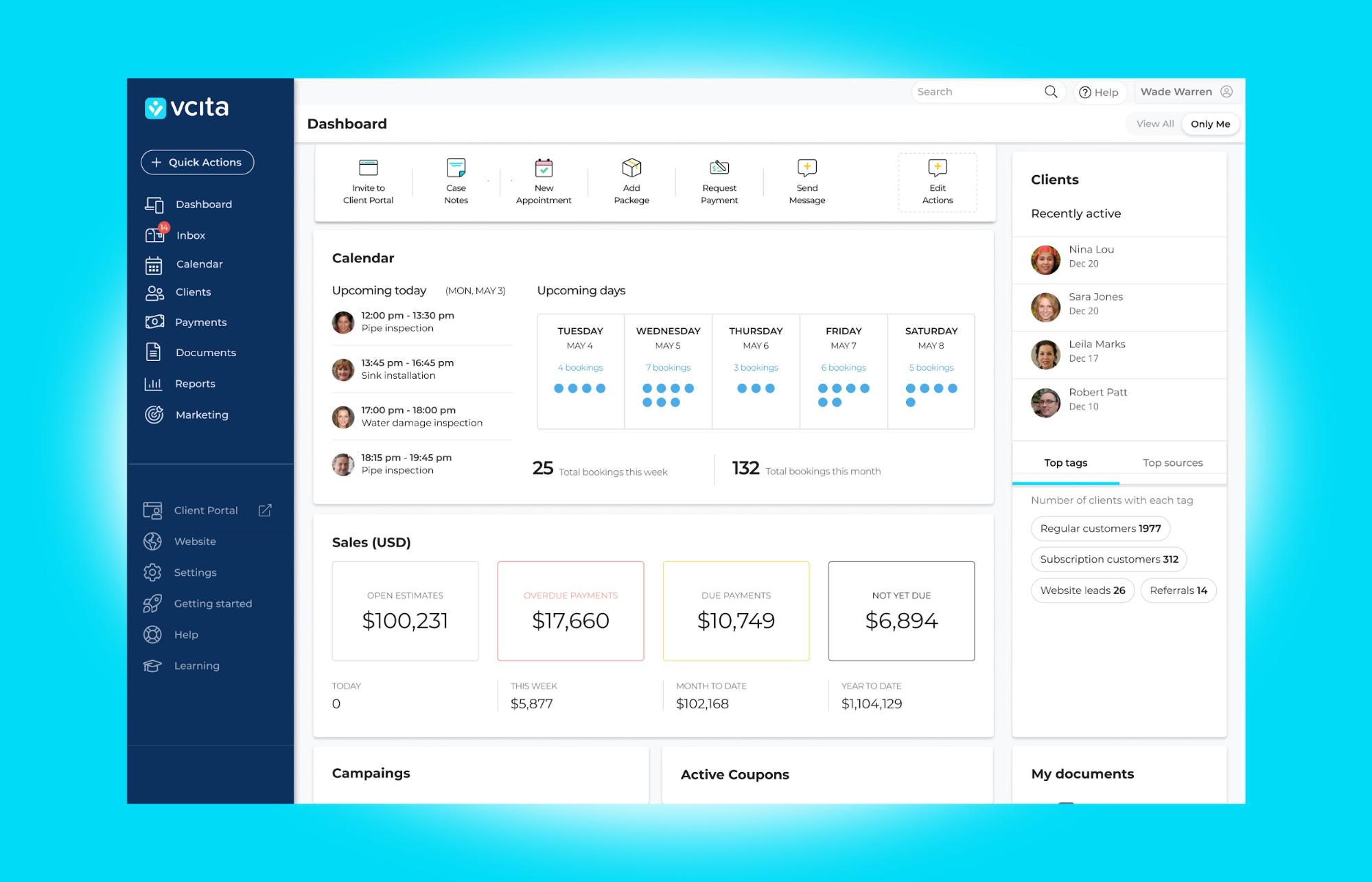
Strengths
- Built-in scheduling and payments: Clients can book, pay and message from one interface
- Simple CRM: Manage client records, relevant communications history and automated reminders
- User-friendly setup: Get started quickly with a platform designed for solo professionals
Weaknesses
- Limited portal functionality: Client portal supports basic interactions but lacks shared workspaces or structured collaboration tools like task management or approvals
- Conditional compliance: HIPAA support is available but requires a specific plan and formal BAA, not included by default
Ideal for
Solo professionals in wellness, coaching, consulting or small-scale services who need a basic CRM and scheduling tool.

How does it compare to Clinked
vcita is built primarily for entrepreneurs in need of light CRM systems, while Clinked provides secure, branded portals suited for effective client collaboration and team workflows.
Ideals
Ideals is a virtual data room platform built for secure document handling in M&A, legal and corporate finance transactions. When used as a customer communication management software, it enables highly controlled customer communications through document permissions, user activity logs and compliance features. It’s good for use cases where business relationships require data exchange, but not necessarily sophisticated communication strategies.
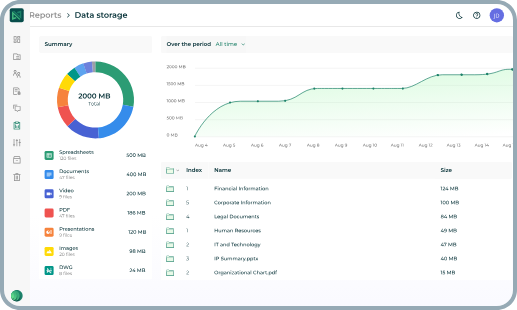
Strengths
- Strong compliance: Stay aligned with ISO, SOC 2 and GDPR standards with advanced security protocols
- Granular permissions: Control user access, apply watermarks and monitor file activity at a detailed level
- Audit-ready environment: Track every action with reporting tools for regulated industries
Weaknesses
- No collaboration tools: Lacks chat, tasks or project-based communication features
- Limited white-labeling: Doesn’t support full branding or custom domains
Ideal for
Legal, finance or corporate teams managing M&A, legal disclosures or due diligence where secure file sharing is the priority.
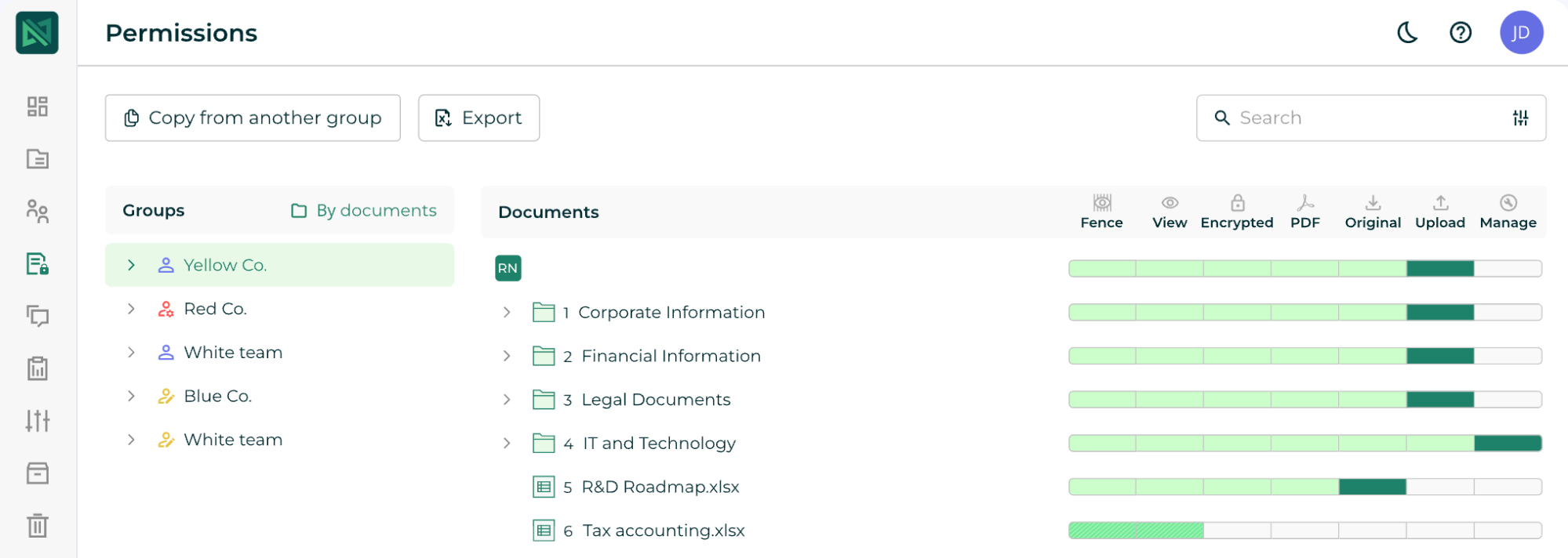
How does it compare to Clinked
Ideals works well when it comes to data protection during transactions; for those customer needs, you don't have to overcomplicate things with complex features. On the other hand, Clinked supports secure collaboration before, during and after, with messaging, tasks and branded portals for enhanced customer experience.
How to choose the right platform
What do you need to know before you create a customer portal that scales your business value?
First of all, not all customer communication management (CCM) solutions are intended for fostering client relationships. Some are marketed as communication tools but stay limited to basics (e.g., support teams), while others handle messaging or file sharing in isolation, without offering a complete, client-facing experience.
When choosing the right CCM platform, focus on how well it supports secure, branded and interactive communication with your clients. Your CCM tool is the buffer zone between your clients and your company, so it must reflect your professionalism, protect sensitive data and make every interaction feel effortless. This is what helps your clients feel confident, engaged and taken care of.
Here are the key factors to consider:
- White-label and branding support: A customer communication management solution should feel like an extension of your business. Look for tools that offer custom domains, logo placement and the ability to brand the customer experience from login to mobile app.
- Regulatory compliant communications (ISO, HIPAA, GDPR): If your work involves sensitive data (financial records, legal documents or health information), ensure the CCM's key benefits are certificates, compliance with relevant standards and secure cloud storage for all documents.
- Client-facing features (chat, tasks, approvals): Effective communication management is not limited to file sharing. The right customer communication management software should offer real-time messaging, task assignments, file requests and approval workflows that reduce back-and-forth. A mobile app for easy access would be ideal.
- Integrations with tools (Google Workspace, DocuSign, calendars): A good customer communication platform fits into your existing systems. Native integrations or Zapier support for your email, calendar, document signing and storage tools save time and prevent data duplication.
- Support and onboarding: Look for solutions that are easy to set up for both your team and your clients. Bonus points for providers that offer responsive support agents, helpful documentation or onboarding services.
Why Clinked stands out in 2026
Plenty of tools support client communication, one way or another. Some offer messaging without document control. Others handle files, but lack real collaboration features. Clinked stands out by bringing branding, compliance and ease of use together in one secure, customizable platform designed for client-facing work.
Clinked is purpose-built for managing customer communications in a secure, branded way. From document sharing and messaging to tasks and approvals, it brings everything into a centralized client portal that looks and feels like your own. In practice, this approach helps teams achieve great results by meeting customer expectations, providing timely communication and delivering prompt responses to customer inquiries.
With ISO 27001 certification and GDPR and HIPAA compliance, it’s trusted by teams that handle sensitive data every day. When managing regulatory compliance is not on your plate, you can focus on the essential: customer experience management.
With over 300 features, Clinked serves multiple industries, including legal, finance, healthcare, education and professional services. It’s flexible enough for freelancers managing a few clients and powerful enough for enterprises rolling out branded portals across departments or geographies.
What really sets it apart from competitors is the balance: simple setup, full white-labeling, deep collaboration features and audit-ready compliance, all without the need for custom development. It’s a rare combination and exactly what modern client-facing teams need.
Final thoughts
Many tools can help you improve customer satisfaction. However, customer communication management software enables organizations to prioritize client relationships, laying the groundwork for long-term customer loyalty.
What client-facing teams need is a single, secure platform combining messaging, task management, document sharing and approvals, under your brand. That combination is surprisingly rare.
Clinked delivers on all three fronts: security, white-labeling and collaboration, without the complexity of an ERP or the compromises of a basic chat tool.
Explore Clinked today! Start your free trial or book a demo to see how it can work for your business.
FAQs
Which CCM tool is best?
The best CCM tool depends on your needs: whether that’s secure file sharing, branded portals, real-time messaging or regulatory compliance. If your priority is delivering a professional, collaborative experience while meeting security standards, Clinked is one of the most complete options available.
What is the difference between CRM and CCM?
CRM (Customer Relationship Management) helps track and manage sales, leads and customer data; it’s mostly internal. CCM (Customer Communication Management) focuses on how you interact with clients: sharing files, messaging, managing approvals and delivering updates. While CRM focuses on managing information, CCM is about managing conversations and collaboration.
What is CCM in software?
CCM stands for Customer Communication Management. Such software helps businesses create, manage and deliver communications (like files, messages, updates and approvals) securely and consistently across client-facing channels.
What is customer management software?
Customer management software encompasses tools like CRM, CCM, helpdesk platforms and portals, all designed to help you handle customer relationships. Some platforms track data, others automate messages, and some (like Clinked) enable real-time collaboration and document workflows in a branded space.